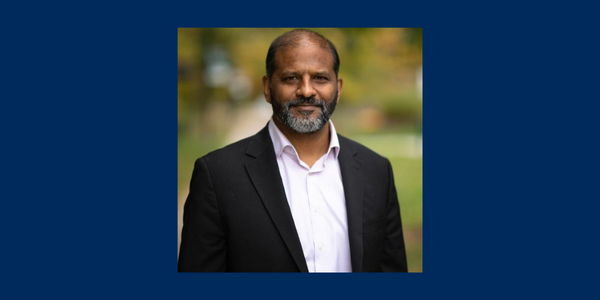UTM’s Vice-Dean, Graduate Studies and Postdoctoral Affairs on the new Global Past project and graduate studies at the Mississauga campus

By Carla DeMarco, UTM
Sometimes an academic connects with their material on a whole new, visceral level, and this was definitely the case for Ajay Rao, who says that his encounter being immersed in the Sanskrit language while studying in India in the early aughts was a turning point for him.
“Hearing it was so beautiful,” says Rao, UTM’s vice-dean, graduate studies and postdoctoral affairs.
“I just found it was like listening to a violin or something. Aesthetically, I thought it amazing, and then I was hooked. And after that, I just felt this is what I want to do for the rest of my life.”
Raised in Detroit, Rao completed his PhD in the History of Religions at the University of Chicago in 2006 before joining the Department of Historical Studies at UTM, where he is currently an associate professor, and cross-appointed to the Department for the Study of Religion at UofT.
Rao’s research has focused primarily on Sanskrit literature and Sanskrit intellectual history from the premodern world (before circa 1500), as well as religion in South India. However, a new project, the Global Past, has him exploring ways in which to rethink scholarly approaches to humanities research and has connected him with a robust network of academics at UofT and around the world. This research endeavour recently received a boost of funding through UofT’s Connaught Global Challenge Award to further their work and to move beyond traditional and mostly Eurocentric approaches to history, where much of the Global South is underrepresented.
“We have such an amazing group that we’ve assembled for this collaborative research project,” says Rao in a recent interview on the VIEW to the U podcast.
“Some of our partners are textualists and there are others, like UTM Professor Jill Caskey, whose area of expertise is visual studies, and of course, there are other fields we would like to branch into, like perhaps global philosophy. Since our group is made up of scholars from various disciplines, the way we even approach texts and objects is different, but this has led to some great conversations, for instance, with our collaborators in Cairo and Pondicherry [India] about their archives, and so it’s very empowering for those institutions as well, because they’re talking with us, but they’re also talking with each other. It’s very unusual for a pre-modernist sitting in Pondicherry to be talking to their counterpart in Cairo, and that’s the kind of thing we’re trying to facilitate.”
Facilitation factors prominently in Rao’s other role overseeing UTM’s grad and postdoctoral portfolio. In his position as the Vice-Dean, which he has undertaken over the past six months with a term extending to 2025, his ambitions are to further establish international partnerships and increase its international PhD contingent, as well as enhance the graduate student presence on campus.
A strong foundation has been laid at UTM with impressive and innovative labs like the Critical Digital Humanities Initiative and the UTM Robotics cluster, however Rao says that UTM is poised to take its graduate student and postdoctoral community to the next level. Some of the initiatives on the horizon include finding new ways to support, such as funding opportunities, and also potentially adding new research graduate programs that would be unique to UTM, as well as ensuring that there are spaces on campus that will attract and retain talent at both the graduate and postdoctoral level.
“This is a really important moment for UTM, something that’s been building for a long time, and I think it is going to be a powerful transformation,” says Rao.
“This is going to take a lot of work, but there is a lot of creative energy here. And I cannot overstate how the benefits of having graduate students on campus has far-reaching impacts that is beneficial on so many levels, from helping undergraduate students to inspiring the faculty who are engaged in their research. It’s really my hope, in the next decade, it will be obvious – that ‘oh, yeah, there’s a lot happening in graduate studies at UTM.’ I think we have to believe in that and we have this opportunity and drive to build great things here.”
Resources
- For more information on Professor Ajay Rao’s work see his website in the Department of Historical Studies.
- Read more about the Global Past project that Professors Rao and Caskey are spearheading.
- Listen to the full VIEW to the U interview with Professor Rao from January 2023.
